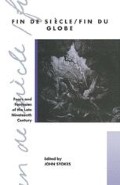Abstract
In his book Going to Miami (1987), which is about the futuristic ethnic and cultural mix that has developed in Miami as a result of Cuban and Latino immigration, David Rieff expresses his outrage at having to share his flight from Kennedy to Miami with two students from the University of Miami, a ‘muscular-looking, blond-downed’ white boy and a ‘tall black girl’. Although the boy is reading Dubliners, Rieff is convinced from overhearing their slangy conversation that ‘the copy of Joyce was a bit of protective coloration’ and that the students have ‘a collective IQ barely above room temperature’. Indeed, they remind him of the post-apocalyptic world divided between ‘the perfectly formed, brainless Eloi’ and ‘a hideous, competent tribe of subterraneans, the Morlocks’, in H. G. Wells’s The Time Machine. As Rieff notes, ‘The Morlocks look after the Eloi, and intermittently, pause to eat them, a perfectly sensible arrangement which the traveller (played by Rod Taylor in the fifties film) screws up. These kids across from me, incapable of uttering a humane sentence, were Eloi. There was nothing whatsoever in their heads and … I wanted to eat them.’1
Access this chapter
Tax calculation will be finalised at checkout
Purchases are for personal use only
Preview
Unable to display preview. Download preview PDF.
Notes
David Rieff, Going to Miami (New York: Penguin, 1987) p. 18
Patrick Brantlinger, Rule of Darkness: British Literature and Imperialism, 1830–1914 (Ithaca: Cornell University Press, 1988) p. 231.
Deborah E. Nord, ‘The Social Explorer as Anthropologist: Victorian Travellers among the Urban Poor,’ in Visions of the Modern City ed. William Sharpe and Leonard Wallock (New York: Columbia University Press, 1983) p. 119.
Edward Said, Orientalism (New York: Vintage, 1979) p. 190.
Hélène Cixous, ‘The Laugh of the Medusa’, in New French Feminisms, eds. Elaine Marks and Isabelle de Courtrivon (Amherst: University of Massachusetts Press; London: Harvester, 1987) pp. 245–64
Joseph Boone, Tradition Counter Tradition: Love and the Form of Fiction (Chicago: University, of Chicago Press, 1987) p. 231.
Judith L. Sensibar, ‘Edith Wharton Reads the Bachelor Type,’ American Literature, 60, December 1988, p. 582.
Frank McConnell, The Science Fiction of H. G. Wells (Oxford: Oxford University Press, 1981) p. 82.
Preface to Random House edition, quoted in Harry Geduld (ed.), The Definitive Time Machine (Bloomington: Indiana University Press, 1987) p. 96
John Batchelor, H. G. Wells (Cambridge: Cambridge University Press, 1985) p. 10.
Quoted in Debora L. Silverman, Art Nouveau in Fin-de-Siècle France (Berkeley: University of California, 1989) p. 72.
Constance Penley, ‘Feminism, Film Theory, and the Bachelor Machines,’ The future of an Illusion (Minneapolis: University of Minnesota Press; London: Routledge, 1989) p. 57.
‘Arts de Mourir: Écritures anti-mystiques,’ Les machines célibitaires, éd. Jean Clair and H. Szeeman (Venice: Alfieri, 1975) p. 94; and Sigmund Freud, ‘The Interpretation of Dreams’ (1900), Standard Edition of the Collected Works, Volume V (London: the Hogarth Press, 1955) p. 356.
John Huntington, The Logic of Fantasy (New York: Columbia University Press, 1982) p. 45.
William Bellamy is the only other critic I have found who notices this pun. See The Novels of Wells, Bennett and Galsworthy: 1890–1910 (London: Routledge & Kegan Paul, 1971) p. 67.
Wells, quoted in Norman and Jeanne Mackenzie, The Time Traveller: The Life of H. G. Wells (London: Weidenfeld & Nicolson, 1973) p. 118.
Wells, quoted in Arthur H. Lawrence, ‘The Romance of the Scientist: An Interview with Mr. H. G. Wells,’ in H. G. Wells: Interviews and Recollections, ed. J. R. Hammond (London: Macmillan, 1980) p. 4.
See Gillian Beer, ‘The island and the aeroplane: The case of Virginia Woolf’ in Nation and Narration, ed. Homi K. Bhabha (London: Routledge, 1990) pp. 265–88.
Coral Lansbury, The Old Brown Dog: Women, Workers, and Vivisection in Edwardian England, (Madison: University of Wisconsin Press, 1985) p. x.
For a discussion of cannibalism in literature, see Maggie Kilgour, From Communion to Cannibalism: An Anatomy of Metaphors of Incorporation (Princeton: Princeton University Press, 1990).
Copyright information
© 1992 Elaine Showalter
About this chapter
Cite this chapter
Showalter, E. (1992). The Apocalyptic Fables of H. G. Wells. In: Fin de Siècle/Fin du Globe. Warwick Studies in the European Humanities. Palgrave Macmillan, London. https://doi.org/10.1007/978-1-349-22421-0_5
Download citation
DOI: https://doi.org/10.1007/978-1-349-22421-0_5
Publisher Name: Palgrave Macmillan, London
Print ISBN: 978-1-349-22423-4
Online ISBN: 978-1-349-22421-0
eBook Packages: Palgrave Literature & Performing Arts CollectionLiterature, Cultural and Media Studies (R0)

